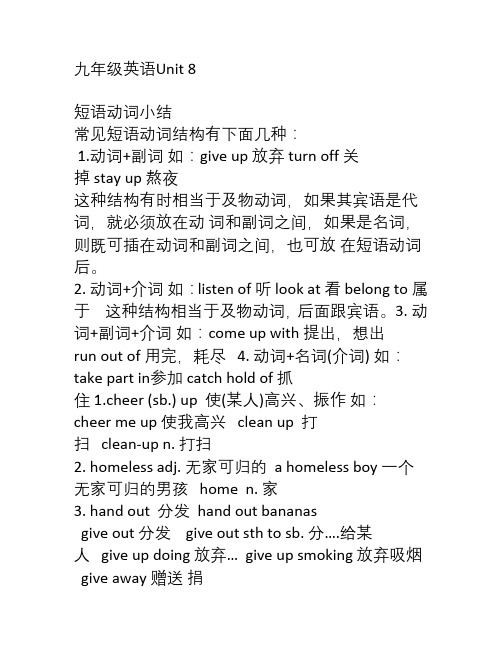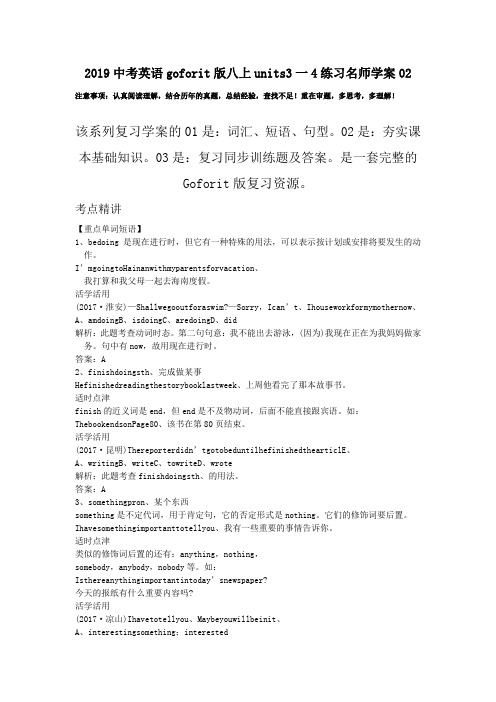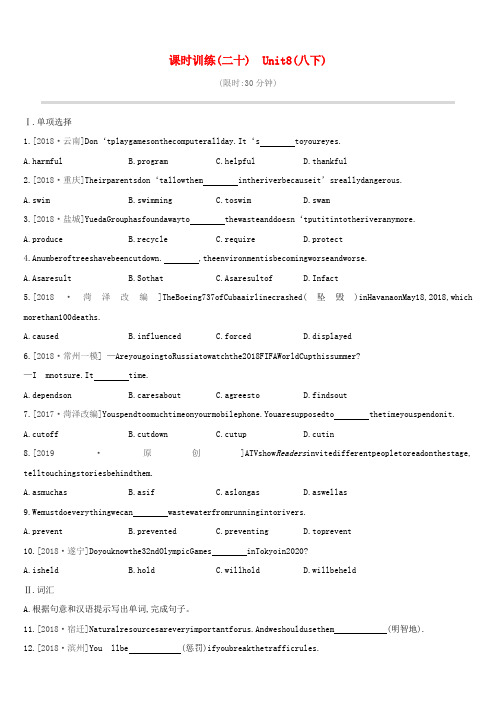2019中考英语复习资料: 8表示"花时间做某事"的句型
- 格式:doc
- 大小:14.00 KB
- 文档页数:1

九年级英语Unit 8短语动词小结常见短语动词结构有下面几种:1.动词+副词如:give up 放弃 turn off 关掉 stay up 熬夜这种结构有时相当于及物动词,如果其宾语是代词,就必须放在动词和副词之间,如果是名词,则既可插在动词和副词之间,也可放在短语动词后。
2. 动词+介词如:listen of 听 look at 看 belong to 属于这种结构相当于及物动词,后面跟宾语。
3. 动词+副词+介词如:come up with 提出,想出run out of 用完,耗尽 4. 动词+名词(介词) 如:take part in参加 catch hold of 抓住 1.cheer (sb.) up 使(某人)高兴、振作如:cheer me up 使我高兴 clean up 打扫 clean-up n. 打扫2. homeless adj. 无家可归的 a homeless boy 一个无家可归的男孩 home n. 家3. hand out 分发 hand out bananasgive out 分发 give out sth to sb. 分….给某人 give up doing 放弃… give up smoking 放弃吸烟give away 赠送捐赠 give away sth. to …. give away money to kid s give sb. sth. 给某人某东西 give me money 给我钱 give sth. to sb. 给某人某东西 give money to me 给我线 4. sick adj. 生病的作表语、定语ill adj. 生病的作表语,不能作定语 5. volunteer to do v. 志愿效劳、主动贡献 volunteer n. 志愿者6. come up with 提出想出 === think up 想出 catch up with 赶上追上 7. put off doing 推迟做某事 put on 穿上 (指过程) put up 张贴8. write down 写下记下9. call up 打电话 make a telephone call 打电话10. set up 成立建立The new hospital was set up in 2000. 这座医院是在2000年成立的。

中考复习之词汇运用词汇运用题:考查学生对单词的拼写能力,以及词形变化、测试内容以实词为主,虚词为辅。
做好这类题,一般应遵循下面几个步骤:第一步读懂句意,判断词性;第二步确定词形;第三步核对答案。
名词:单数、复数、所有格、大写;动词:时态、语态、非谓语动词形式;(一般现在时用三单;已经有动词用非谓语)形容词:原级、比较级、最高级;(“的”)副词:原级、比较级、最高级;(“地”)代词:不定代词、主格、宾格、形容词性物主代词、名词性物主代词、反身代词;数词:基数词、序数词(first, second, third, fourth, fifth)冠词:a / an / the (首次提到用a / an;特指用the)连词:and,but,or,because,so,when,where,before,after,if…介词:at,by,to,in,for,of,on,from,with…中考复习之选词填空二、选词填空解题注意事项1.先对备选词汇的词性作简单标记,如名词(n.)、动词(v.)、形容词(adj.)、副词(adv.)等。
同时对词义做初步的理解。
2.根据题意或通读全文,猜测空格中所缺的信息,注意固定搭配,根据需要去备选词汇中寻找匹配的答案。
3.填词过程中注意词形的变化。
既要符合本句的含义,又要保证句式结构的正确。
为了方便记忆,试着记住下面的顺口溜:空前空后要注意;“名词”单复数要牢记,还有“'s”不能弃;“动词”注意要变形,“形副”注意三种级;要填“数词”请留意,千万别忘“基”和“序”;填入“代词”需慎重,五格变化要谨记。
4.完成填词后,应通读全文,复核校对。
检查单词拼写是否正确,是否有时态、语态、习惯用法及词语选用上的错误,以确保答案的正确性。
最后填答案时,切勿错位。
中考复习之语法填空步骤:1.快速浏览,了解大意。
对于简单有把握的空,可以先填出来;2.上下查看,填出答案。
根据上下文及空格前后的逻辑关系,填出正确的词以及正确的形式;3.通读全文,检查确认。

2019中考英语goforit版八上units3一4练习名师学案02注意事项:认真阅读理解,结合历年的真题,总结经验,查找不足!重在审题,多思考,多理解!该系列复习学案的01是:词汇、短语、句型。
02是:夯实课本基础知识。
03是:复习同步训练题及答案。
是一套完整的Goforit版复习资源。
考点精讲【重点单词短语】1、bedoing是现在进行时,但它有一种特殊的用法,可以表示按计划或安排将要发生的动作。
I’mgoingtoHainanwithmyparentsforvacation、我打算和我父母一起去海南度假。
活学活用(2017·淮安)—Shallwegooutforaswim?—Sorry,Ican’t、Ihouseworkformymothernow、A、amdoingB、isdoingC、aredoingD、did解析:此题考查动词时态。
第二句句意:我不能出去游泳,(因为)我现在正在为我妈妈做家务。
句中有now,故用现在进行时。
答案:A2、finishdoingsth、完成做某事Hefinishedreadingthestorybooklastweek、上周他看完了那本故事书。
适时点津finish的近义词是end,但end是不及物动词,后面不能直接跟宾语。
如:ThebookendsonPage80、该书在第80页结束。
活学活用(2017·昆明)Thereporterdidn’tgotobeduntilhefinishedthearticlE、A、writingB、writeC、towriteD、wrote解析:此题考查finishdoingsth、的用法。
答案:A3、somethingpron、某个东西something是不定代词,用于肯定句,它的否定形式是nothing。
它们的修饰词要后置。
Ihavesomethingimportanttotellyou、我有一些重要的事情告诉你。

第8课八上 Units 7—8课前预热中考词汇拓展中考词组短语中考句型回顾课堂突破中考重点单词与短语一、with的用法【例句展示】1. He spends all his free time with his grandson.他和他的孙子/外孙度过他所有的空闲时间。
2. Next to the hotel is a small house with a beautiful garden.旅馆旁边是一个带有美丽花园的小房子。
3. Don’t write with the red pen.不要用这支红色的钢笔写字。
4. The girl with long hair is my classmate.那个长头发的女孩是我的同学。
5. Don’t be angry with me for my being late.不要因为我迟到而生我的气。
【精讲辨析】with作介词,意为“和;同;与;用;以;被;随着;戴着;有着……的;因为;由于”。
反义词为without。
相关短语:play with...与……一起玩;be angry with...对……生气;talk with... 与……交谈;get on well with... 与……相处融洽;help sb. with... 在……方面帮助某人;fill...with...用……把……装满。
【活学活用】根据汉语意思翻译句子。
1. 你能和我一起去公园吗?Can you go to the park__________ me?2. 那个手里拿着一本书的男孩来自英国。
The boy__________ a book in his hand is from the UK.3. 中国是一个有着悠久历史的伟大国家。
China is a great country__________ .二、turn on的用法【例句展示】It’s really dark, please turn on the light.天太黑了,请开一下灯。

课时训练(二十) Unit8(八下)(限时:30分钟)Ⅰ.单项选择1.[2018·云南]Don‘tplaygamesonthecomputerallday.It‘s toyoureyes.A.harmfulB.programC.helpfulD.thankful2.[2018·重庆]Theirparentsdon‘tallowthem intheriverbecauseit’sreallydangerous.A.swimB.swimmingC.toswimD.swam3.[2018·盐城]YuedaGrouphasfoundawayto thewasteanddoesn‘tputitintotheriveranymore.A.produceB.recycleC.requireD.protect4.Anumberoftreeshavebeencutdown. ,theenvironmentisbecomingworseandworse.A.AsaresultB.SothatC.AsaresultofD.Infact5.[2018·菏泽改编]TheBoeing737ofCubaairlinecrashed(坠毁)inHavanaonMay18,2018,which morethan100deaths.A.causedB.influencedC.forcedD.displayed6.[2018·常州一模]—AreyougoingtoRussiatowatchthe2018FIFAWorldCupthissummer?—I mnotsure.It time.A.dependsonB.caresaboutC.agreestoD.findsout7.[2017·菏泽改编]Youspendtoomuchtimeonyourmobilephone.Youaresupposedto thetimeyouspendonit.A.cutoffB.cutdownC.cutupD.cutin8.[2019·原创]ATVshow Readers invitedifferentpeopletoreadonthestage, telltouchingstoriesbehindthem.A.asmuchasB.asifC.aslongasD.aswellas9.Wemustdoeverythingwecan wastewaterfromrunningintorivers.A.preventB.preventedC.preventingD.toprevent10.[2018·遂宁]Doyouknowthe32ndOlympicGames inTokyoin2020?A.isheldB.holdC.willholdD.willbeheldⅡ.词汇A.根据句意和汉语提示写出单词,完成句子。

八年级上册u7词组句型知识点在八年级英语的学习中,第七单元是关于词组和句型的知识点。
这些词组和句型对于学生的英语阅读和表达有着十分重要的作用。
本文将概括性地介绍这些知识点。
一、词组1. be busy doing sth.忙于做某事例句:我太忙于准备考试,没有时间去打篮球。
I am too busy preparing for the exam to play basketball.2. have no time to do sth. 没有时间去做某事例句:他太忙于工作,没有时间和我们一起吃饭。
He is too busy with his work to have dinner with us.3. get to know 认识,了解例句:当我来到这座城市后,我很快就和当地的人们交上了朋友。
I got to know the local people soon after I came to this city.4. be afraid of 害怕,担心例句:她害怕狗,所以她总是避开他们。
She is afraid of dogs, so she always avoids them.5. be good at 擅长,善于例句:我的妹妹擅长下厨房,她的菜总是很好吃。
My younger sister is good at cooking, and her dishes are always delicious.6. work hard 努力工作例句:你必须努力工作,才能取得好成绩。
You have to work hard to get good grades.7. stop doing sth. 停止做某事例句:我们必须停止使用塑料袋,以保护环境。
We must stop using plastic bags to protect the environment.8. make a difference 有影响例句:我们每个人都能在环保方面做出贡献,使世界变得更加美好。
中考英语必考的12个重要句型1. It's+adj.+for sb.+to do sth. 对某人来说做某事怎么样,如:It is dangerous for children to play in the street. 孩子们在街上玩是很危险的。
2. It's time for sth. 是干某事的时间了;It's time(for sb.)to do sth.该干某事了。
如:①It's time for the meeting. 该开会了。
②It's time for us to go to school. 我们该上学了。
3. It takes sb. some time to do sth. 做某事花某人一些时间。
sb. spend some time/money on sth./(in)doing sth. 某人花时间(金钱)在某事上/花时间(金钱)干某事。
sth. cost sb. some money 某事花某人一些钱。
pay some money for sth.为某事(物)付钱。
如:①It took me two hours to write the letter. 写这封信花了我两小时的时间。
②He spends half an hour( in )reading English every morning.他每天早上花半小时读英语。
③He spends one hour on the housework every day. 他每天花一小时做家务。
④The bike cost me 500 yuan. 这辆自行车花了我500元。
⑤I spent 500 yuan on the bike. 我买这辆自行车花了500元。
⑥I paid 500 yuan for the bike. 我花了500元买这辆自行车。
重要提示:cost主语一般为物;spend, pay主语一般为人。
第18课九年级 Units 7—8课前预热中考词汇拓展中考词组短语中考句型回顾课堂突破中考重点单词与短语一、allow的用法【例句展示】1. My parents allow me to see films with my friends on weekends. 我的父母允许我周末与朋友去看电影。
2. In our school, boys are not allowed to have long hair.在我们学校,男生不允许留长发。
【精讲辨析】1. allow作动词,意为“允许”。
2. allow sb. to do sth.允许某人做某事。
3. be allowed to do sth.被允许做某事。
【活学活用】用allow的适当形式填空。
1. —My parents________ me to stay out before 10:00 p.m. at weekends.—You are lucky. I must be back home at 9:00 p.m.2. I think teenagers should________ choose their own clothes.二、pick up的用法【例句展示】1. Would you mind picking it up?你介意把它捡起来吗?2. Could you pick me up at the station?你能在车站捎上我吗?【精讲辨析】pick up为“动词+副词”型短语,代词作宾语时应放两词中间,意为“拾起;捡起;中途载客;收拾;整理”等。
【活学活用】用适当的词填空。
Karin saw some waste paper. She it and threw it into the dustbin.三、get sth. done的用法【例句展示】Anna wants to get her ears pierced.安娜想去打耳洞。
1. allow sb. to do sth. 允许某人去做某事(后接动词不定式)2. asked sb. (not) to do sth. 叫某人做事某事(叫某人不要去做某事)be asked to do sth. 被叫去做某事/被邀请去做某事3. be afraid to do sth. 害怕做某事4. be afraid of doing sth. 害怕做某事5. be afraid of sth. 害怕某物6. be amazed to do sth. 对做某事感到惊讶be amazed at sth. 对某事感到惊讶7. be busy doing/with sth. 忙于做某事(常考)9. be excited to do sth. 对做……感到兴奋10. be frightened to do sth. 害怕去做某事be pleased to do sth. 高兴做某事be pleased with sth. 对某事感到高兴/满意12. be interested in sth./doing sth. 对某事感兴趣/对做某事感兴趣13. be/get ready for/to do sth.Be ready for sth. 为某事做好了准备Be ready to do sth. 为做某事做好了准备.get ready for sth.为某事在做准备get ready for sth. 为做某事而做准备13. be sorry to do sth. 对做某事感到抱歉14. be surprised to do sth. 对做某事感到惊奇be surprised at sth. 对某事感到惊奇15. be worth doing sth. 值得做某事(worth 后接动词-ing形式,常考)16. begin to do sth.begin/start to do/doing sth.19. can’t wait to do sth. 迫不急待地去做某事20. decide to do sth. 决定去做某事make up one’s mind to do sth. 下决心去做某事(常考)make a decision to do sth. 对做某事作出决定21. deserve to do sth. 值得/应该做……22. encourage sb. to do sth. 鼓励某人去做某事23. enjoy doing sth. 乐意去做某事24. expect (sb.) to do sth. 期望去做某事25. fail to do sth. 做某事失败succeed doing sth. 成功做了某事26. finish doing sth. 做完某事(后接动词-ing形式)(常考)27. follow sb to do sth. 跟随某人去做某事28. get sb. to do sth.make sb. do sth.let sb. do sth.29. get/have a chance to do sth. 得到一个做某事的机会30. give/pass/show/lend/sell sb. sth./ sth. to sb.buy/get/bring sb. sth. / sth. for sb.31. go on to do sth. 继续做事(常考)go on doing sth. 继续做事(常考)32. hate to do/doing sth. 讨厌/不喜欢做某事33. have fun doing sth.34. have problems doing sth. 做某事遇到困难35. have sb. do sth.have sth. donehave sth. to do 有事要做36. hear sb. do sth. 听到某人做某事(后接动词原形,常考)hear sb. doing sth. 听到某人正在做某事(常见) 37. help to do sth. 帮忙做某事help sb. (to) do sth. 帮助某人做某事38. hope/wish to do sth. 希望做某事wish sb. to do sth. 希望某人做某事seem to do sth.40. It’s + adj.+(for sb.) to do sth.It’s + adj. +(of sb.) to do sth.41. It takes sb. some time/money to do sth. 花费某人多长时间做某事(常考)42. pay …for…cost spend…on….. it take …to do sth.43. It’s best for sb to do sth.. 对某人来说做某事是最好的had better do sth. 最好做某事(注意had没有时态和人称的变化,better后接动词原形)44. It’s time for sb. to do sth. 是某人做某事的时候了45. keep (on)doing sth. 坚持做某事(常考)keep sb. doing sth. 让某人做某事(常考)keep sb. from doing sth. 阻止某人做某事(常考)46. lean to do sth. 学做某事learn sth. from sb. 向某人学习47. like to do/doing sth. 喜欢做某事like sb. to do sth. 喜欢某人做某事48. need to do sth.need doing sth./to be done50. refuse to do sth. 拒绝做……51. remember/forget to do sth. 记得/忘记做某事remember/forget doing sth. 记得/忘记做过某事52. see sb. do sth. 看见某人做某事(结果)see sb. doing sth. 看见某人正在做某事(正在进行中) be seen to do sth. 做某事被看见54. spend some time (in)doing sth. /on sth. 花费时间做某事(注意动词要用ing形式)(常考)56. stop to do sth. 停下来去某事(两件事) (常考)stop sb. (from) doing sth. 阻止某人做某事(常考) 58. tell sb. (not) to do sth. 叫某人去(不要)做某事be told to do sth. 被告知不要做某事59. There is no need (for sb.) to do sth. 对某人来说没必要做某事60. There is no time (for sb.) to do sth.have no time to do sth. 没时间做某事61. too…(for sb.) to …太……以致不能……62. try/do one’s best to do sth. 尽力去做某事try to do sth. 试着(图)做某事63. used to do sth. 过去常做某事( used to be + adj./ a +n)64. want/would like to do sth. 想做……want/would like sb. to do sth. 想某人做……feel like doing sth. 喜爱做某事(注意like后接动词ing 形式65. warn sb. (not) to do sth. 警告某人做某事(或不要做某事67. Would you like (sb.) to do sth.? Yes, I’d love to.68. Would you mind doing sth.? 你介意做某事吗?69. Would you please (not) do sth. 你可不可以不做……?70. enjoy doing sth 享受或喜欢做某事be busy doing sth 忙于做某事try doing 试着做某事ask sb.to do 叫某人做某事forget doing 忘记已经做过的事forget to do 忘记要做某事remember to do 记得要做某事(还没做过)remember doing 记得做过的事let sb do 让某人做某事make sb do 使某人做某事like doing sth 喜欢做某事(习惯上的)start to do sth 开始做某事start doing sth 开始做某事finish doing sth 完成....Mind doing sth 介意做某事(一般现在时态)be doing 正在做...would like to do (表示意愿)spend......(in) doing sth 花费....做...look forward to doing sth 期待做某事want to do sth 想要做某事decide to do sth 决定...It takes sb sometime to do sth 花费某人多少时间做...be going to do sth/will do(一般将来时态)将要做某事Thank for doing sth 感谢做某事。
2019中考英语必考八大时态总结在初中阶段,我们学习到的常用的时态有8种:一般现在时,一般过去时,现在进行时,过去进行时,现在完成时,过去完成时,一般将来时和过去将来时。
一下将对初中阶段英语时态知识要点、考点进行归纳总结,希望能对大家复习备考与解题有所帮助。
.1 一般现在时的用法1) 经常性或习惯性的动作,常与表示频度的时间状语连用。
时间状语:every…,sometimes,ofen,always,usually, twice a week, at…, on SundayI leave home for school at 7 every morning. He watches Tv once a week .2) 客观真理,客观存在,科学事实。
The earth moves around the sun. Shanghai lies in the east of China.3) 表示格言或警句中。
Pride goes before a fall. 骄者必败。
注意:此用法如果出现在宾语从句中,即使主句是过去时,从句谓语也要用一般现在时。
例:Columbus proved that the earth is round..4) 现在时刻的状态、能力、性格、个性。
I don't want so much. Ann Wang writes good English but does not speak well.比较:Now I put the sugar in the cup. I am doing my homework now.第一句用一般现在时,用于操作演示或指导说明的示范性动作,表示言行的瞬间动作。
再如:Now watch me, I switch on the current and stand back. 第二句中的now是进行时的标志,表示正在进行的动作的客观状况,所以后句用一般现在时。
2019中考英语复习资料:8表示"花时间做某事"的句型
Lesson 8
关键句型一:表示”花时间做某事”的句型(以本题为例)
1. They spend 25 minutes doing sports every day.
2. The students put 25 minutes into sports activities every day.
3. They put in 25 minutes doing sports every day.
4. 25 minutes is spent on the sports every day.
5. 25 minutes is taken up by sports activities every day.
6. 25 minutes goes into sports every day.
关键句型二:表达看法的句型(以本题为例)
1. I think the school should encourage the students to exercise more after class.
2. In my opinion, the school should encourage the students to exercise more after class.
3. Personally, I believe the students should get more exercise after class.
4. After reading these charts, I can’t help thinking that the school should encourage the students to exercise more after class.
5. If you ask me, I think the school should encourage the students to do more exercise after class.
6. It seems to me that the school should encourage the students to get more exercise after class.
7. I’d just like to say the school should encourage the students to do more exercise after class.
8. I’d like to point out that the students should exercise more after class.
9. As far as I’m concerned, the students should do more exercise after class. 【as far as I’m concerned: 就我而言】
10. From my point of view, the school should encourage the students to exercise more after class.。